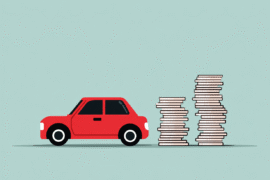This article may contain references to products or services from one or more of our advertisers or partners. We may receive compensation when you click on links to those products or services. Nonetheless, our opinions are our own.
The information presented in this article is accurate to the best of our knowledge at the time of publication. However, information is subject to change, and no guarantees are made about the continued accuracy or completeness of this content after its publication date.
- Assessing Your Financial Situation After Job Loss
- Prioritizing Your Expenses And Creating A New Budget
- Options For Loan Management And Restructuring
- Communicating With Lenders To Find Relief
- Finding Alternative Income Sources
- Using Unemployment Benefits And Financial Assistance
- Rebuilding Financial Health
- Final Thoughts
- Frequently Asked Questions
- How does not paying loans on time impact my credit score?
- Are there resources available for people who have lost their jobs?
- Should I consider combining my loans?
- Does losing my job hurt my credit score immediately?
- What expenses should I prioritize in my budget?
- Can I pause my loan payments during unemployment?
- Recommended Reads
Assessing Your Financial Situation After Job Loss
Facing job loss can feel really hard. It can be tough to understand your money situation. The first thing you should do is look at what you have. Get all your financial papers together. Check your income, spending, and debts. This will help you see your current situation. You might also want to make a simple table. A table can help you understand your financial status better.
| Item | Amount |
|---|---|
| Monthly Income | $0 |
| Monthly Expenses | $2,500 |
| Total Debt | $15,000 |
Once you have this information, it is important to sort your expenses. You can divide your spending into two groups: needs and wants.
- Needs: housing costs, bills, food, protection
- Wants: eating out, memberships, fun activities
By paying attention to what you need and reducing your wants, you can make your savings last longer while searching for a new job. It’s important to talk to your lenders, too. They might give you some temporary help, like deferring payments or setting up payment plans. This can make your money situation easier while you go through this change.
Prioritizing Your Expenses And Creating A New Budget
When you are going through tough financial times, the first thing to do is list your necessary expenses and see what you can cut back on. You might want to make a simple list of what is most important to you during this change. Here is how to do it:
- Essentials: rent or mortgage, utilities, groceries, and insurance. These are must-haves to keep your life stable.
- Debt Repayment: set aside money for minimum loan payments. This helps you avoid default. Focus on paying high-interest loans first.
- Discretionary Spending: figure out what can wait. Cut back on dining out, subscriptions, and luxury items. Hold off on these while you get back on track.
| Category | Estimated Monthly Cost |
|---|---|
| Housing | $1,200 |
| Utilities | $150 |
| Groceries | $300 |
| Transportation | $100 |
| Debt Payments | $200 |
| Discretionary Spending | $50 |
By knowing where your money is going, you can decide where to spend less. This helps you make sure your basic needs are met. Don’t forget, your budget can change. Adjust it as you deal with new situations and get a better feel for your finances.
Options For Loan Management And Restructuring
When you feel unsure about your job, handling your money can feel tough. However, there are ways to manage it. Start by looking closely at your financial situation. Check your loans, monthly bills, and where your money comes from. This will help you see how flexible you can be and which choices are right for you.
Here are a few potential strategies to consider:
- Contact your lenders:reach out to your lenders as soon as you can. Talk about your situation. Many companies have plans for those who are having money problems.
- Explore loan modification: a loan modification can set up a new repayment plan with adjusted terms.
- Consider debt consolidation: combining multiple loans into one may reduce your interest rate and payments.
- Seek professional advice: a financial advisor or nonprofit credit counseling agency can help you find suitable options.
| Option | Description | Benefits |
|---|---|---|
| Loan Forbearance | Temporary suspension of payments | Reduces immediate financial pressure |
| Debt Consolidation | Combine multiple loans into one | Can lower monthly payments |
| Loan Modification | Alter the terms of existing loans | More manageable payments |
Communicating With Lenders To Find Relief
When you lose a job and feel worried about money, talking to your lenders is a great first step. It may feel heavy, but contacting them could help you find ways to make things easier.
- Be honest: explain your situation clearly. Lenders may be more flexible when they understand your challenges.
- Explore options: ask about forbearance, deferment, or loan term changes.
- Document your situation:prepare documents like a termination letter or bank statements to show financial hardship.
| Debt Type | Monthly Payment | Remaining Balance |
|---|---|---|
| Personal Loan | $300 | $5,000 |
| Auto Loan | $250 | $7,000 |
| Credit Card | $150 | $2,000 |
Voted "Best Overall Budgeting App" by Forbes and WSJ
Monarch Money helps you budget, track spending, set goals, and plan your financial future—all in one app.
Get 50% OFF your first year with code MONARCHVIP
Finding Alternative Income Sources
When you lose your job and face loan payments, finding new ways to make money can help. Consider freelance work, part-time jobs, or gig economy opportunities that fit your skills and schedule.
- Online Tutoring
- Rideshare Driving
- Pet Sitting or Dog Walking
- Virtual Assistant Work
You can also monetize hobbies, such as crafting on Etsy, meal prep services, or renting out a room on Airbnb. Choose options that align with your lifestyle and financial goals.
Using Unemployment Benefits And Financial Assistance
During uncertain times like losing a job and struggling with loan payments, unemployment benefits and local financial aid programs can provide temporary support. These resources may include financial counseling, utility assistance, or food support programs. Exploring all available benefits can help reduce financial pressure while you search for new employment.
Rebuilding Financial Health
When facing unemployment, it’s important to plan actively. Create a budget, track income and expenses, and focus on essentials. Use budgeting tools to identify savings opportunities. Keep open communication with creditors and ask about hardship programs.
| Loan Type | Remaining Balance | Payment Due Date | Status |
|---|---|---|---|
| Personal Loan | $3,000 | 15th of each month | Contacted Lender |
| Credit Card | $2,500 | 30th of each month | Payment Deferred |
| Auto Loan | $8,000 | 1st of each month | Negotiating Terms |
Building an emergency fund, improving your skills, and exploring new career opportunities are important steps toward long-term stability.
Final Thoughts
If you lose your job and have loans to handle, start by reviewing your financial situation. Track your monthly expenses, debt obligations, and income needs. Reach out to lenders early to request deferment, forbearance, or modified payment plans. Acting quickly can help you avoid fees, credit damage, or default. Nonprofit and government programs may also provide valuable support. With careful budgeting, clear priorities, and proactive planning, you can rebuild financial stability and prepare for future opportunities.
Frequently Asked Questions
How does not paying loans on time impact my credit score?
Missing loan payments negatively affects your credit score because payment history is a major factor in credit scoring. Communicating with your lender may help you find temporary relief options to avoid late payments.
Are there resources available for people who have lost their jobs?
Yes, nonprofit organizations and government programs provide financial counseling, utility aid, and support for overdue bills. Local resources and online platforms can also connect you to assistance programs.
Should I consider combining my loans?
Loan consolidation may be beneficial if you have multiple debts with high interest rates. It can simplify payments and lower rates, but review terms carefully to ensure it fits your long-term goals.
Does losing my job hurt my credit score immediately?
Losing a job does not directly lower your credit score, but missing payments due to unemployment will negatively impact it. Payment history is the most significant factor in maintaining your score.
What expenses should I prioritize in my budget?
Focus first on essentials like housing, utilities, food, and transportation. Debt repayment should follow, with discretionary spending reduced or paused until income improves.
Can I pause my loan payments during unemployment?
Many lenders offer deferment or forbearance programs that allow temporary pauses or reduced payments. Contact your lender immediately to discuss your situation and available options.

Reviewed and edited by Albert Fang.
See a typo or want to suggest an edit/revision to the content? Use the contact us form to provide feedback.
At FangWallet, we value editorial integrity and open collaboration in curating quality content for readers to enjoy. Much appreciated for the assist.
Did you like our article and find it insightful? We encourage sharing the article link with family and friends to benefit as well - better yet, sharing on social media. Thank you for the support! 🍉
Article Title: Financial Recovery: Managing Loans After Job Loss
https://fangwallet.com/2025/09/06/financial-recovery-managing-loans-after-job-loss/The FangWallet Promise
FangWallet is an editorially independent resource - founded on breaking down challenging financial concepts for anyone to understand since 2014. While we adhere to editorial integrity, note that this post may contain references to products from our partners.
The FangWallet promise is always to have your best interest in mind and be transparent and honest about the financial picture.
Become an Insider

Subscribe to get a free daily budget planner printable to help get your money on track!
Make passive money the right way. No spam.
Editorial Disclaimer: The editorial content on this page is not provided by any of the companies mentioned. The opinions expressed here are the author's alone.
The content of this website is for informational purposes only and does not represent investment advice, or an offer or solicitation to buy or sell any security, investment, or product. Investors are encouraged to do their own due diligence, and, if necessary, consult professional advising before making any investment decisions. Investing involves a high degree of risk, and financial losses may occur including the potential loss of principal.
Source Citation References:
+ Inspo
There are no additional citations or references to note for this article at this time.












































